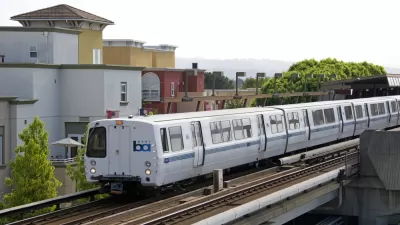A new report by the Bay Area Council argues that the regionwide housing crisis demands a regionwide response, i.e., all nine counties and 101 cities need to build more housing, and if they don't, there needs to be consequences.
As the title of the Bay Area Council report indicates, the “Roadmap for Economic Resilience” is about keeping the Bay Area a "global economic powerhouse." It's biggest threat is from within—by not addressing challenges as a region.
"The need is perhaps most visible in the housing crisis that has become one of San Francisco’s most contentious issues," writes David R. Baker, energy and clean tech reporter for the San Francisco Chronicle.
For years, the region has not been building enough housing, said Jim Wunderman, President and CEO of the Bay Area Council. Some cities have actively encouraged new housing while others have tried to shut it out. Unaffordable prices are the result.
“The core issue is under-supply,” Wunderman said.
"But the report’s prescriptions for solving the crisis would be difficult to carry out, in part because they would require cities to give up some of their power," writes Baker
For example, regional planners already set goals for the number of housing units each Bay Area city should build, goals that many cities routinely ignore. The report recommends punishing cities that don’t meet the targets, perhaps by stripping them of the ability to approve or reject development projects.
BAC is not the first to recommend a stern approach to cities refusing to do their "fair share." "Renters' advocates in San Francisco are building a political and fundraising base to legally challenge suburbs that aren't pulling their weight in constructing the housing to meet the demands of population growth," wrote Planetizen managing editor James Brasuell in September.
An alternative approach would "expand 'by right' approval for housing," writes Baker. "If a proposed housing project complied with local zoning and building codes, no city would be able to block it." See by-right housing, "in which certain multifamily housing are designated a permitted use" (California Government Code Section 65589.4).
The report also looks at other regional issues such as transportation, recommending "establishing a regional gasoline tax, sales tax or vehicle license fee (VLF)," adds Baker.
Hat tip: MTC-ABAG Library
FULL STORY: Bay Area group’s housing solution: Punish cities that don’t build

Planetizen Federal Action Tracker
A weekly monitor of how Trump’s orders and actions are impacting planners and planning in America.

Chicago’s Ghost Rails
Just beneath the surface of the modern city lie the remnants of its expansive early 20th-century streetcar system.

San Antonio and Austin are Fusing Into one Massive Megaregion
The region spanning the two central Texas cities is growing fast, posing challenges for local infrastructure and water supplies.

Since Zion's Shuttles Went Electric “The Smog is Gone”
Visitors to Zion National Park can enjoy the canyon via the nation’s first fully electric park shuttle system.

Trump Distributing DOT Safety Funds at 1/10 Rate of Biden
Funds for Safe Streets and other transportation safety and equity programs are being held up by administrative reviews and conflicts with the Trump administration’s priorities.

German Cities Subsidize Taxis for Women Amid Wave of Violence
Free or low-cost taxi rides can help women navigate cities more safely, but critics say the programs don't address the root causes of violence against women.
Urban Design for Planners 1: Software Tools
This six-course series explores essential urban design concepts using open source software and equips planners with the tools they need to participate fully in the urban design process.
Planning for Universal Design
Learn the tools for implementing Universal Design in planning regulations.
planning NEXT
Appalachian Highlands Housing Partners
Mpact (founded as Rail~Volution)
City of Camden Redevelopment Agency
City of Astoria
City of Portland
City of Laramie





























